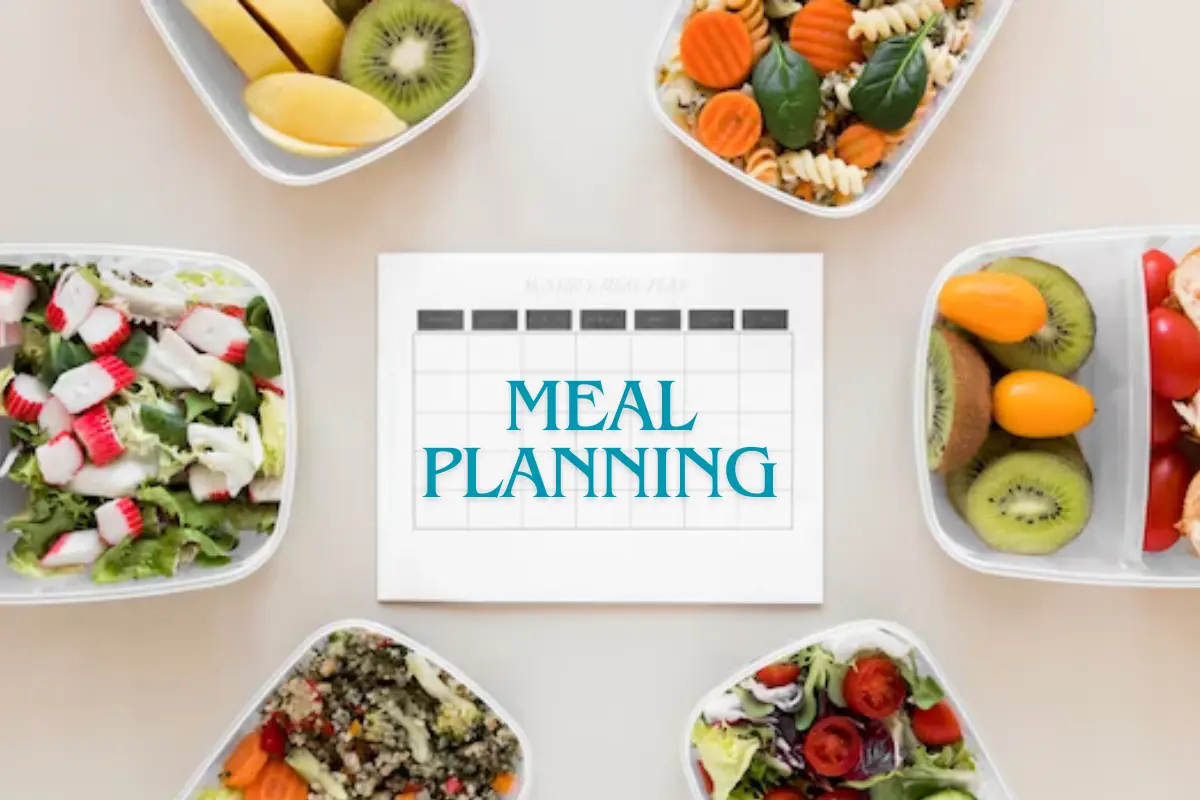Introduction
In society with hasty activities and countless dining choices on the rise, Meal Planning comes to embody not only empowered nutrition but also healthy living. This extensive book allows a deep analysis of the complex network of concepts supporting good men planning, revealing those strategies that enable you to prepare nutrient dense food which looks appetizing and can be enjoyed very much in accordance with your personal needs. It becomes something great beyond nourishment demonstrates to be an active measure in advancing wellbeing overall, weight control, vitality and productiveness.

Understanding the Importance of Meal Planning
Meal planning is extremely good beneficial because it maintains you organized and saves you time. You recognize precisely what meals you will have for the duration of the week, so that you do not need to pressure about what to prepare dinner each day. Plus, it enables you’re making more healthy alternatives. By deliberately choosing nutritious components and making plans balanced food, you may gasoline your body with the proper nutrients.
Meal planning additionally facilitates you keep cash and reduce meals waste. You can create a shopping listing and keep away from impulse purchases, which is superb to your budget and the surroundings. And of route, it lets in you to meet your dietary dreams. Whether you want to boom your fiber intake, hold a healthy intestine, or gain a balanced weight loss plan, meal planning facilitates you live heading in the right direction. It’s a top notch way to take manipulate of your nutrients and make healthy consuming a constant a part of your lifestyle.
Setting Clearly Defined Goals:
Effective meal planning starts with setting specific goals. Whether you’re attempting to lose weight, gain muscle, or simply keep up a healthy diet, having defined goals will help you customise your meal plan to your needs.
Evaluating Nutritional Needs:
It’s crucial to understand your dietary requirements and plan your meals. Considerations for diet should include age, gender, degree of exercise, and any dietary preferences or constraints.
A varied selection of meals from several dietary categories make up a well-rounded meal plan.
Diversified and Balanced Meals.
A range of nutrients from various food groups can be found in a diversified and well-balanced meal plan. Include foods rich in vitamins, minerals, carbohydrates, fats, and proteins to enhance overall health and wellbeing. Don’t forget to consume a variety of fresh produce, whole grains, lean proteins, and healthy fats.
 Meal control:
Meal control:
Focus on portion control to maintain a healthy calorie intake.In order to achieve certain objectives, such as weight management or blood sugar level maintenance, meal control include monitoring portion sizes, meal scheduling, and food selections. It’s critical to pay attention to your body’s signals of hunger and fullness, eat slowly, and prevent overeating. Organising meals in advance and including a variety of nutrient-rich foods can also help
Make a plan:
A meal plan must be created. To ensure you have all the components on hand and avoid making bad selections on the spur of the moment, develop a weekly schedule.To keep your energy levels up and avoid feeling really hungry, space out your meals throughout the day. To save time and make healthy choices easier, plan your meals for the coming week and prepare the items in advance.
Batch cooking and meal preparation:
Batch cooking and meal planning preparation are efficient strategies for saving time and maintaining a healthy diet.Here’s how you may technique it:
- Create a Menu: Choose the dishes you desire to cook ahead of time. Mix proteins, vegetables, grains, and properly fats in your food plan.
- Purchasing meals: To make sure you have got all of the elements you need, make a shopping list based totally for your menu.
- Prep Ingredients: Wash, chop, and element meals such as culmination, veggies, and meats. This speeds up the guidance of food.
- Prepare in Batches: Prepare bigger quantities of certain foods that can be used in numerous meals, such as cereals, proteins, and sauces.
 Plan your grocery list thoughtfully depending on your meal plan.
Plan your grocery list thoughtfully depending on your meal plan.
To avoid impulse purchases and to remain concentrated on your dietary goals, stick to your list.Based on your meal plan, make a detailed list of all the ingredients you’ll need to buy. To prevent overspending or forgetting critical products, check your pantry and refrigerator for what you currently have and be sure to specify quantities.
Shop smart:
While shopping, stick to your list and abstain from impulsive purchases.Consider purchasing in bulk if the food is non-perishable or something you use frequently. When feasible, choose seasonal and fresh products for superior nutrition and flavour.
Prepare beforehand:
To save time during the hectic weekdays, spend some time preparing dishes or ingredients. Prepare cereals in advance, marinade meats, and chop vegetables. When you’re ready to cook, this will make dinner preparation quicker and simpler.
Remain arranged:
To prevent stress or missing supplies at the last minute, keep track of your grocery list and meal plan. You can make a note on your phone, utilise a planner, or plan your meals using an app. You’ll be able to keep on track if everything is in one location.
Be flexible:
A menu plan Allow for scheduling modifications or unforeseen circumstances because life can be unpredictable. If your initial plan needs to be modified, have fallback options, such as simple recipes or frozen meals, available.
Use leftovers:
Don’t throw away any leftovers. Add them to your plan for the following day or repurpose them into new meals. You’ll save time and help reduce food waste by doing this.
 Enjoy variety:
Enjoy variety:
To keep things interesting and prevent meal boredom, include a variety of flavours, cuisines, and ingredients in your meal plan. To liven things up, experiment with fresh recipes or various cooking methods.
Think about it and make changes:
Evaluate your meal preparation routine frequently, and adapt as necessary. Consider what went well and what didn’t, then adjust as necessary. This will make meal planning more effective and pleasant while also assisting you in constantly improving your skills.
Flexibility and Adaptability
Your meal plan needs to be adaptable because life might be unpredictable. Don’t let modifications and substitutions affect your overall nutrition.
- Adapting to Changes: Being willing to experiment with new foods, cooking methods, or eating habits to meet your changing requirements or preferences.
- Managing Challenges: Choosing the appropriate course of action in light of the scenario when dealing with unforeseen events that could disturb your routine, such as social gatherings or travel.
- Balancing Health and Enjoyment: Finding a happy medium between eating healthily and giving oneself the occasional pleasure or indulgence but still keeping a balanced diet.
- Work and personal life: Managing changes at work, coping with unforeseen circumstances, and acclimating to new locations or responsibilities all require flexibility and adaptability.
- Because life can be unpredictable, it’s important for your food plan to be flexible. Don’t let substitutes and alterations throw off your total nutrition.
Hydration:
Don’t forget the beverages. It is impossible to overestimate the value of maintaining hydration. herbal teas made with water and other calorie-free drinks.For maintaining general health and wellbeing, hydration is crucial. 
- Importance of Water: Water’s importance is underscored by means of the truth that it is crucial for several frame procedures, including digestion, circulate, temperature law, and waste removal.
- Daily Fluid Needs: Depending in your age, level of pastime, the climate, and fashionable fitness, you could require greater or less water every day. Aim for 8 glasses (8 ounces each) of water per day as a general guideline, however individual requirements may vary.
- Signs of Thirst: Pay attention to your body’s cues to drink water. A clue that your body needs fluids is feeling thirsty.
Portability and Convenience:
Due consideration To save time during the hectic weekdays, spend some time preparing dishes or ingredients. Prepare cereals in advance, marinade meats, and chop vegetables. This will establish a consistent schedule for meals. To make sure your meal plan fits lifestyle, pick meals that are easy to carry and enjoy on the move.
Enjoyment and Sustainability:
Make sure the foods in your meal plan are ones you enjoy. Sustainability is crucial for long-term maintenance of a balanced diet.
Keep in mind that you can adjust these suggestions to meet your specific needs and preferences.. You can prepare dinner with the aid of these instructions.
Principles of meal planning Vedio tutorial:- for you :
Conclusion:
A few fundamental ideas underpin efficient meal planning, which supports time management, balanced nutrition, and the accomplishment of personal objectives. You may make a well-rounded meal plan by taking into account aspects including dietary requirements, preferences, portion control, and convenience. Making preparations for ingredients beforehand, planning ahead, and shopping wisely can speed up the cooking process. Keep in mind that flexibility is crucial since it enables you to adjust to changes while remaining dedicated to your health goals. Effective meal planning ultimately gives you the power to make wise dietary decisions, which enhances your general wellbeing.
FAQs
What are the principles of meal planning?
Meal planning principles: Balance, portion control, variety, moderation, timing, preferences, budget, convenience, sustainability.
What are the 5 basic steps of meal planning?
Set goals and priorities. Choose recipes and foods. Make a shopping list. Prepare and cook meals. Store and reheat as needed.
What is the importance of meal planning?
Meal planning is important because it saves time, money, reduces stress, and promotes healthier eating habits.
What are 4 meal planning guidelines?
Four meal planning guidelines include: Consider nutritional needs: Ensure meals meet dietary requirements. Portion control: Watch serving sizes for calorie management. Balance: Include a mix of proteins, carbs, and veggies. Plan ahead: Prepare meals in advance to save time and money.
How many types of meal planning are there?
There are several types of meal planning, including batch cooking, meal prepping, and themed meal planning.
